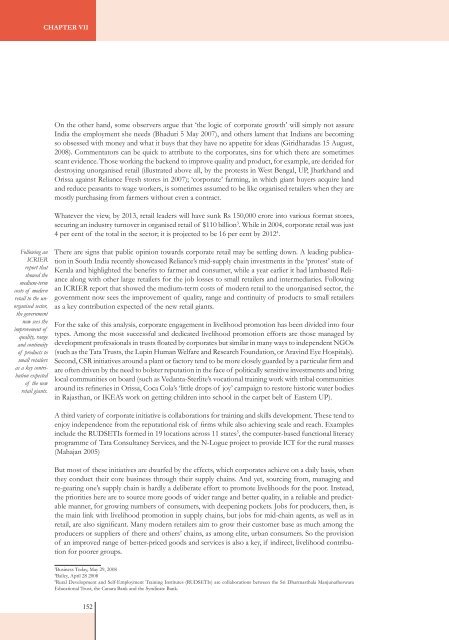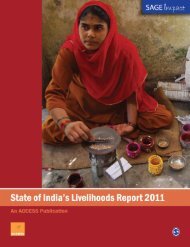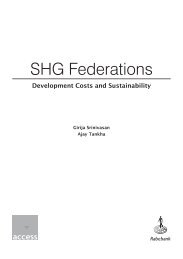Chapter VIIOn the other hand, some observers argue that ‘the logic of corporate growth’ will simply not assureIndia the employment she needs (Bhaduri 5 May 2007), and others lament that Indians are becomingso obsessed with money and what it buys that they have no appetite for ideas (Giridharadas 15 August,<strong>2008</strong>). Commentators can be quick to attribute to the corporates, sins for which there are sometimesscant evidence. Those working the backend to improve quality and product, for example, are derided fordestroying unorganised retail (illustrated above all, by the protests in West Bengal, UP, Jharkhand andOrissa against Reliance Fresh stores in 2007); ‘corporate’ farming, in which giant buyers acquire landand reduce peasants to wage workers, is sometimes assumed to be like organised retailers when they aremostly purchasing from farmers without even a contract.Whatever the view, by 2013, retail leaders will have sunk Rs 150,000 crore into various format stores,securing an industry turnover in organised retail of $110 billion 3 . While in 2004, corporate retail was just4 per cent of the total in the sector; it is projected to be 16 per cent by 2012 4 .Following anICRIERreport thatshowed themedium-termcosts of modernretail to the unorganisedsector,the governmentnow sees theimprovement ofquality, rangeand continuityof products tosmall retailersas a key contributionexpectedof the newretail giants.There are signs that public opinion towards corporate retail may be settling down. A leading publicationin South India recently showcased Reliance’s mid-supply chain investments in the ‘protest’ state ofKerala and highlighted the benefits to farmer and consumer, while a year earlier it had lambasted Reliancealong with other large retailers for the job losses to small retailers and intermediaries. Followingan ICRIER report that showed the medium-term costs of modern retail to the unorganised sector, thegovernment now sees the improvement of quality, range and continuity of products to small retailersas a key contribution expected of the new retail giants.For the sake of this analysis, corporate engagement in livelihood promotion has been divided into fourtypes. Among the most successful and dedicated livelihood promotion efforts are those managed bydevelopment professionals in trusts floated by corporates but similar in many ways to independent NGOs(such as the Tata Trusts, the Lupin Human Welfare and Research Foundation, or Aravind Eye Hospitals).Second, CSR initiatives around a plant or factory tend to be more closely guarded by a particular firm andare often driven by the need to bolster reputation in the face of politically sensitive investments and bringlocal communities on board (such as Vedanta-Sterlite’s vocational training work with tribal communitiesaround its refineries in Orissa, Coca Cola’s ‘little drops of joy’ campaign to restore historic water bodiesin Rajasthan, or IKEA’s work on getting children into school in the carpet belt of Eastern UP).A third variety of corporate initiative is collaborations for training and skills development. These tend toenjoy independence from the reputational risk of firms while also achieving scale and reach. Examplesinclude the RUDSETIs formed in 19 locations across 11 states 5 , the computer-based functional literacyprogramme of Tata Consultancy <strong>Services</strong>, and the N-Logue project to provide ICT for the rural masses(Mahajan 2005)But most of these initiatives are dwarfed by the effects, which corporates achieve on a daily basis, whenthey conduct their core business through their supply chains. And yet, sourcing from, managing andre-gearing one’s supply chain is hardly a deliberate effort to promote livelihoods for the poor. Instead,the priorities here are to source more goods of wider range and better quality, in a reliable and predictablemanner, for growing numbers of consumers, with deepening pockets. Jobs for producers, then, isthe main link with livelihood promotion in supply chains, but jobs for mid-chain agents, as well as inretail, are also significant. Many modern retailers aim to grow their customer base as much among theproducers or suppliers of there and others’ chains, as among elite, urban consumers. So the provisionof an improved range of better-priced goods and services is also a key, if indirect, livelihood contributionfor poorer groups.3Business Today, May 29, <strong>2008</strong>4Bailey, April 28 <strong>2008</strong>5Rural <strong>Development</strong> and Self-Employment Training Institutes (RUDSETIs) are collaborations between the Sri Dharmasthala ManjunatheswaraEducational Trust, the Canara Bank and the Syndicate Bank.152
The Contribution of Corporate Supply Chains to the Livelihoods of the Poor2. Modernising supply chains and livelihoodsBefore proposing a framework of analysis, some international evidence on corporate retail supply chainsand their effects on livelihoods must be summarised in order to gauge what one may expect in India.First is the argument that supply chains more tightly integrated to markets make for better ‘ethics’. Asfirms build their brands, they are said to have a growing interest in reputation, which may induce themto push for fairer practices in their supply chains (Weiser 2001, 101; Singh, Kundu et al. 2005). But this iscountered by the evidence that brand retailer giants are disinclined to build long and steady relationshipswith suppliers. Their wealth resides increasingly in the ‘intangibles’ of marketing, the creation of shoppingenvironments and the rapid churning of ‘new’ products on their shelves. “The faster the productcycle time and the shorter the planning horizons, the less pressure there is for a company to considersocial and environmental issues in its business planning” (Weiser 2001, 101). The evidence suggeststhat supply chains of global brands are not only geographically distant but also often fragmented andopaque, making it hard to push through front-end CSR initiatives. Moreover, if a reputation among one’scustomers must be managed, this can be achieved in ways other than making fundamental changes inthe chain (Oxfam 2004; Barrientos 2006).It is perhaps not so much CSR or ‘ethics’, which travel from front- to back-end in the supply chain ofcorporate retailers, as new forms of regulation and product specification. These regulations and normsrelate to how business should be done between trading partners, and to the quality and product requirementsof the retailer. They influence who, among chain producers and intermediaries, makes the gradeto join and remain within the chain. Ponte and Gibbon (<strong>2008</strong>) argue that such regulations can be understoodas “conventions, normatively-based sources of coordinated economic conduct”. The authorsdevelop the idea of ‘soft power’ by which the participation of supply chain players in economic activityis governed by these informal rules and norms.An IFPRI-commissioned study illustrates how such ‘soft power’ is applied across procurement centresfor supermarkets in developing countries. “Chains and their specialised wholesalers tend to move fromspot markets to preferred supplier lists when the need for quality and consistency is high and whenfarmers or processors are associated or individually large” (16). The study finds that supermarkets tendtowards sourcing from larger suppliers (particularly in meat and dairy), but that “small farmers are notexcluded, except when certain factors affect the farmers’ capacity to implement certain technologies thathave an impact on quality, productivity, costs, or the ability to plant or harvest at the necessary timesduring the year” (20).Anna Tsing (<strong>2008</strong>) brings a similar analysis to bear on the suppliers of Wal-Mart worldwide. She showsthat in its suppliers’ code of conduct, Wal-Mart is clear that it wants control, but only over some things(e.g. prices, marketing, logistics) and not others (e.g. labour arrangements, environmental practices andsubcontractors’ investment strategies) (Tsing <strong>2008</strong>, 14). 6 “Compliance [to the supplier code] is both voluntaryand required. Such practices remind us that supply chains weave complex corporate dependenciesinto the fabric of their commitments to the independence of firms” (14).In this new ‘soft’ regulatory imperative, the IFPRI study shows that non-capital asset factors play a keyrole in determining who can participate, for example, a farmer’s educational level and access to goodroads, irrigation and cold storage infrastructure. It also shows that those who secure a foothold in thechain, over time, experience tension with their supermarket buyers, who typically pay after a time lag,impose a series of fees on suppliers, and demand post-harvest services from them, apart from imposingstringent quality and product standards (Reardon and Gulati <strong>2008</strong>, 21).6Tsing quotes Petrovic and Hamilton’s study of Wal-Mart, ‘Making global markets: Wal-Mart and its suppliers’, in Lichtenstein, N (2006), ed, Wal-Mart: the Face of Twenty-First Century Capitalism, WW Norton.It is perhapsnot so muchCSR or ‘ethics’,which travelfrom front- toback-end in thesupply chainof corporateretailers, asnew formsof regulationand productspecification.In this new‘soft’ regulatoryimperative, theIFPRI studyshows thatnon-capitalasset factorsplay a key rolein determiningwho canparticipate,for example,a farmer’seducationallevel and accessto good roads,irrigation andcold storageinfrastructure.153
- Page 3 and 4:
State of India’s Livelihoods :The
- Page 5 and 6:
ChapterPage NoForeword 6Preface 8Ab
- Page 8:
ForewordAs a part of its microfinan
- Page 11 and 12:
employment growth, these sectors we
- Page 14:
RIAARMKRRBRSVYSCSC/STsSCPSCSPSERPSE
- Page 20 and 21:
Chapter Iresponse, risks and shocks
- Page 23 and 24:
OverviewTable 1.2 Employment and Un
- Page 25 and 26:
OverviewA recent paper by Arjun Sen
- Page 27:
Overview4. How is the livelihood st
- Page 31 and 32:
Overview5.2 Manmade constraints - i
- Page 33 and 34:
Overviewthe late 1980s, these two m
- Page 35 and 36:
OverviewIn the 1970s, the Chipko mo
- Page 37 and 38:
Overviewsocial responsibility (CSR)
- Page 39 and 40:
OverviewBox 1.3 Bihar - Underdevelo
- Page 42 and 43:
4040
- Page 44 and 45:
Chapter IIAn enumeration of the dep
- Page 46 and 47:
Chapter IIBox 2.1 Macro Level Livel
- Page 48 and 49:
Chapter IIIn addition to the above,
- Page 50 and 51:
Chapter IIFig 2.1: Poverty Ratio am
- Page 52 and 53:
Chapter IIPoormigrantlabouroften su
- Page 54 and 55:
Chapter IIInterestingly, the Govern
- Page 56 and 57:
Chapter IIThe effective cost of nat
- Page 58 and 59:
Chapter IIsector and thereby casual
- Page 60 and 61:
Chapter IIReferences1. Aiyar , Swam
- Page 62 and 63:
Chapter IIIto, the vulnerability co
- Page 64 and 65:
Chapter IIIIt would be useful here
- Page 66 and 67:
Chapter IIIof new employment opport
- Page 68 and 69:
Chapter IIIinterest subvention - wo
- Page 70 and 71:
Chapter III6. The 11th Plan propose
- Page 72 and 73:
Chapter IIIBox 3.5: Rural Business
- Page 74 and 75:
Chapter III9. The achievement of ge
- Page 76 and 77:
Chapter IIIaid. The Plan also seeks
- Page 78 and 79:
Chapter IIIand health. They point o
- Page 80 and 81:
Chapter IIIReferences1. Ambasta, Pr
- Page 82 and 83:
8080
- Page 84 and 85:
Chapter IVtransport, storage, commu
- Page 86 and 87:
Chapter IVing of ‘English Speakin
- Page 88 and 89:
Chapter IVWhile these livelihoods h
- Page 90 and 91:
Chapter IVTable 4.6 Employment with
- Page 92 and 93:
Chapter IVConstruction requires no
- Page 94 and 95:
Chapter IVgains in manufacturing ha
- Page 96 and 97:
Chapter IV10. A Spatial Perspective
- Page 98 and 99:
Chapter IVA quick glance at some of
- Page 100 and 101:
Chapter IV12. Once a watershed is d
- Page 102:
Chapter IVThrougha range ofschemes
- Page 105 and 106: Public Systems: Major central gover
- Page 107 and 108: Public Systems: Major central gover
- Page 109 and 110: Public Systems: Major central gover
- Page 111 and 112: Public Systems: Major central gover
- Page 113 and 114: Public Systems: Major central gover
- Page 115 and 116: Public Systems: Major central gover
- Page 117 and 118: Public Systems: Major central gover
- Page 119 and 120: Public Systems: Major central gover
- Page 121 and 122: Public Systems: Major central gover
- Page 123 and 124: Public Systems: Major central gover
- Page 125 and 126: Public Systems: Major central gover
- Page 127 and 128: Public Systems: Major central gover
- Page 129 and 130: Public Systems: Major central gover
- Page 131 and 132: Public Systems: Major central gover
- Page 133 and 134: Civil Society InitiativesChapter VI
- Page 135 and 136: Civil Society InitiativesThe human
- Page 137 and 138: Civil Society Initiativesso far has
- Page 139 and 140: Civil Society Initiativesan 8 per c
- Page 141 and 142: Civil Society InitiativesThe cooper
- Page 143 and 144: Civil Society Initiativeslimited ir
- Page 145 and 146: Civil Society Initiativesintelligen
- Page 147 and 148: Civil Society InitiativesOutboard M
- Page 149 and 150: Civil Society InitiativesCase Study
- Page 151 and 152: Civil Society InitiativesReferences
- Page 153: The Contribution of Corporate Suppl
- Page 157 and 158: The Contribution of Corporate Suppl
- Page 159 and 160: The Contribution of Corporate Suppl
- Page 161 and 162: The Contribution of Corporate Suppl
- Page 163 and 164: The Contribution of Corporate Suppl
- Page 165 and 166: The Contribution of Corporate Suppl
- Page 167 and 168: The Contribution of Corporate Suppl
- Page 169 and 170: The Contribution of Corporate Suppl
- Page 172 and 173: Chapter VIII170
- Page 174 and 175: Chapter VIIIcountry that make the e
- Page 176 and 177: Chapter VIIIFig 8.4: All-India area
- Page 178 and 179: Chapter VIIIWhen commercial crops l
- Page 180 and 181: Chapter VIIIunit of risk settlement
- Page 182 and 183: Chapter VIIIPublic capitalformation
- Page 184 and 185: Chapter VIII8. Integrated Rural Dev
- Page 186 and 187: Chapter VIIIAn expertpanel ‘sreco
- Page 188 and 189: Chapter VIIIHowever as final wage s
- Page 190: 188
- Page 193 and 194: appENDIX TableTable A.1.3: Distribu
- Page 195 and 196: appENDIX TableEmploymentEmploymentG
- Page 197 and 198: appENDIX TableTable 2: Employment S
- Page 199 and 200: appENDIX TableTable 4: State Wise G
- Page 201 and 202: appENDIX TableTable-7: Distribution
- Page 203 and 204: appENDIX TableDams and Displacement
- Page 205 and 206:
appENDIX TableFig. A.3.2: High Pote
- Page 207 and 208:
appENDIX TableTable A.3.2Table 2: S
- Page 209 and 210:
appENDIX TableChapter IV - ANNEX TA
- Page 211 and 212:
appENDIX TableAnnex A.5.1Backward R
- Page 213 and 214:
appENDIX TableAnnex A.5.3Some UNDP
- Page 215 and 216:
appENDIX TableGross Value of Output
- Page 217 and 218:
Mona DikshitMona Dikshit has been a














